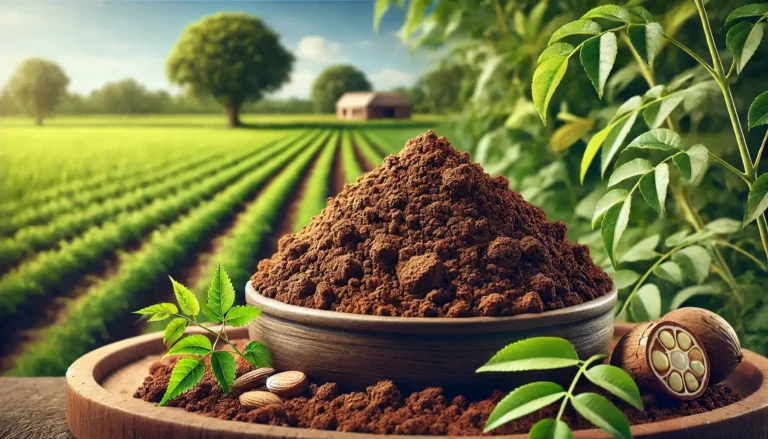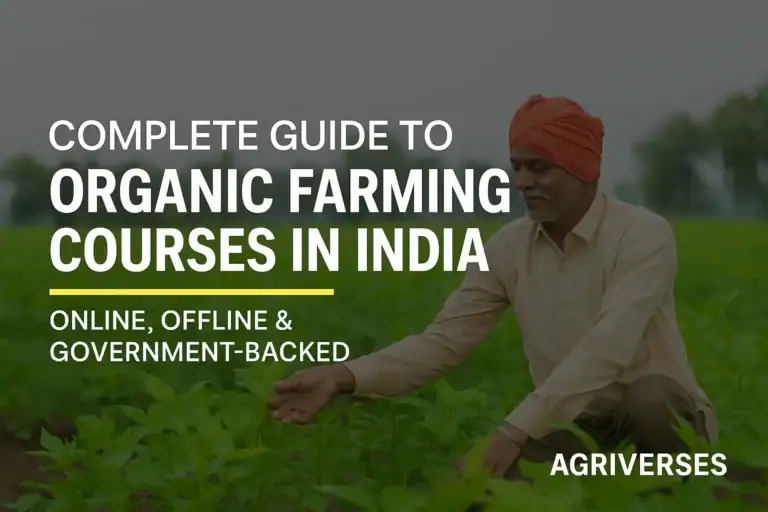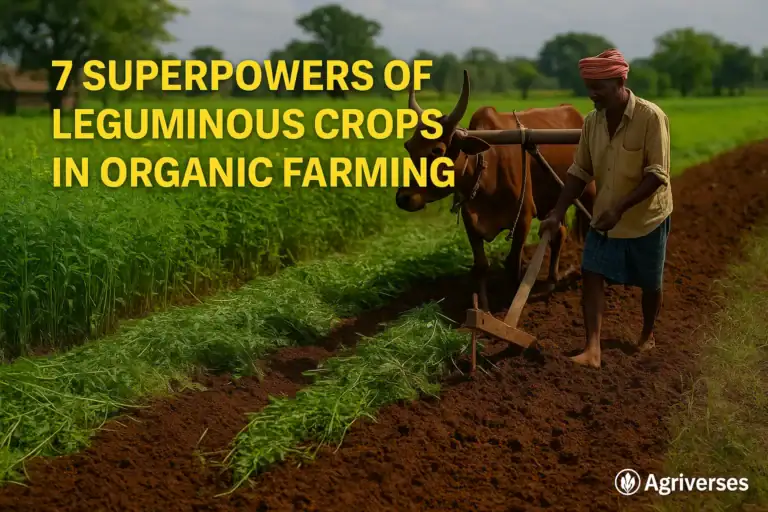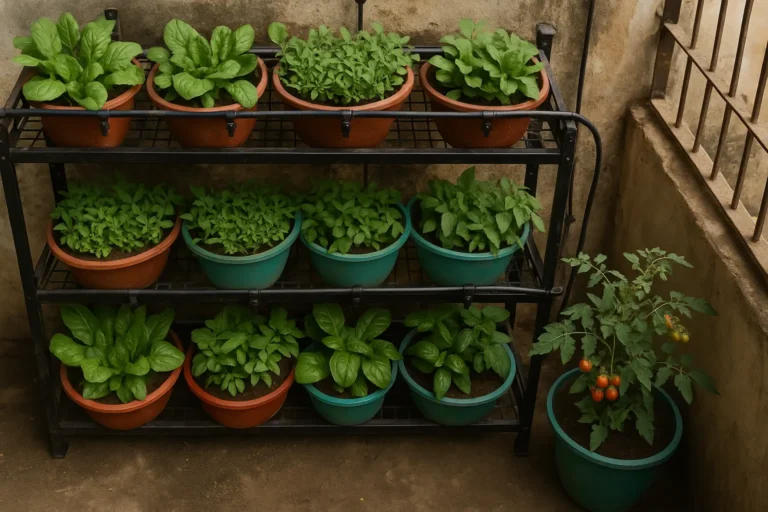Introduction
In a world where chemical fertilizers dominate agriculture, organic farming is making a strong comeback. But here’s the big question—can you truly enrich your soil naturally without toxic chemicals? Absolutely! Organic fertilizers not only boost soil fertility but also restore its natural health, making it more sustainable in the long run.

But which organic fertilizers actually work? What makes them so powerful for soil health? And which brands can you trust in India?
In this guide, we’ll explore the best organic fertilizers—whether for your farm, garden, or even balcony plants. Whether you’re a farmer, an agriculture student, a home gardener, or simply someone passionate about growing plants naturally, this article is for you. Read on to find the perfect organic fertilizer for your needs!
What Are Organic Fertilizers?
Think of your soil as a living, breathing ecosystem. Would you gas it up with a quick-and-dirty fix, or a healthy, long care? That’s the distinction between chemical and organic fertilizers. Plant residues, animal manure, compost, and beneficial microbes are some natural sources of organic fertilizers. Organic fertilizers do not offer an immediate boost as chemical ones do, but instead nourish the earth, stimulate microbial activity and reinforce long-term conditioning. They slowly release nutrients, improving soil structure, enhancing water retention, and promoting sustainable agriculture.
Whether you’re a farmer, an agriculture student, a gardener, or simply someone passionate about growing plants the natural way, organic fertilizers are the key to healthier soil and more resilient crops.
Chemical Fertilizers vs. Organic Fertilizers: Which One is Better for Farming?

| FEATURES | CHEMICAL FERTILIZERS | ORGANIC FERTILIZERS |
|---|---|---|
| 1. Source | Synthetically manufactured | Derived from natural sources (plant, animal, or mineral) |
| 2. Nutrition release | Fast-acting, provides immediate nutrients | Slow release, improves soil over time |
| 3. Impact on soil | Can degrade soil health over time | Enhances soil structure and fertility |
| 4. Microbial life | May reduce beneficial microorganisms | Promotes microbial activity |
| 5. Environmental Impact | Can cause water pollution & soil degradation | Eco-friendly, reduces pollution risks |
| 6. Cost | Generally cheaper initially | May be costlier but offers long-term benefits |
| 7. Yield Effect | Boosts yield quickly | Improves sustainable yields over time |
| 8. Residue and Safety | Chemical residues may remain | No harmful residues, safe for long-term use |
| 9.Best for | High-yield commercial farming | Sustainable, organic, and regenerative farming |
1. What Are Chemical Fertilizers?
Chemical fertilizers are synthetically manufactured nutrients designed to provide instant nourishment to plants. These fertilizers are typically made from minerals, petroleum by-products, and nitrogen-fixing processes.
Common Types of Chemical Fertilizers:
- Nitrogen-based fertilizers (Urea, Ammonium Nitrate) – Promote leafy growth.
- Phosphorus-based fertilizers (DAP, Superphosphate) – Help in root development.
- Potassium-based fertilizers (Muriate of Potash, Potassium Nitrate) – Improve disease resistance.
- NPK fertilizers (This fertilizer is mixture of mainly 3 primary fertilizer which use in almost equal proportion namely as nitrogen, phosphorus and potassium.
Pros of Chemical Fertilizers:
✅ Fast-acting nutrients – Instant availability for plants.
✅ Higher crop yield – Helps meet global food demands.
✅ Precise nutrient control – Can be tailored to specific crops.
Cons of Chemical Fertilizers:
❌ Soil degradation – Long-term use depletes organic matter.
❌ Water pollution – Excess runoff contaminates water bodies.
❌ Harmful to beneficial microbes – Reduces soil biodiversity.
❌ Leads to soil acidity – Continuous use can harm soil pH.
2. What Are Organic Fertilizers?
Organic fertilizers are made from natural plant, animal, or mineral sources. They improve soil fertility gradually by enhancing its organic content.
Common Types of Organic Fertilizers:
- Compost – Decomposed organic waste.
- Vermicompost – Nutrient-rich manure from earthworms.
- Cow dung manure – Traditional farmyard manure.
- Biofertilizers – Living microorganisms that enhance soil fertility.
- Green manure – Cover crops turned into natural fertilizer.
Pros of Organic Fertilizers:
✅ Improves soil structure – Enhances moisture retention.
✅ Eco-friendly – No harmful chemicals or toxins.
✅ Sustains soil health – Encourages beneficial microbes.
✅ Long-lasting benefits – Slow-release nutrients prevent leaching.
Cons of Organic Fertilizers:
❌ Slow nutrient release – Takes time to show results.
❌ Nutrient composition varies – Hard to measure exact NPK ratios.
❌ Bulkier and costly – Requires more storage space and transportation.
Top Organic Fertilizers in India! – The Secret to the Best Soil & Chemical free Crops

Ever wondered why your plants are not prospering as expected despite being watered and cared for regularly? The answer could have been lurking in the dirt!
Chemical fertilizer work like magic initially, but destroy soil health, kill beneficial microbes and leave toxic residues in crops silently. Organic fertilizer are the path to long-term soil fertility, healthy plants and eco-friendly farming, organic fertilizers are your ultimate solution!
But which organic fertilizers work best? How do they improve soil health? And which Indian brands can you trust? Let’s dig into the most powerful organic fertilizer every farmer, gardener, and plant lover should know!
1. Neem Cake Fertilizer – The Organic Pest Fighter
What Is It?
After extracting neem oil, neem cake is a strong byproduct that remains. Full of nitrogen, it enriches soil and serves as a natural pesticide, deterring harmful pests.
Why It’s a Game Changer:
✅ Kills Soil Pests – Shields roots against nematodes and fungi.
✅ Nitrogen Level Enhancer – Improves fertility in soil.
✅ Water retention booster – improves soil structure that allows for better moisture absorption
✅ Green & Safe – Nontoxic residues, it is safe for food crops
Top Indian Brands:
🔹 IFFCO Neem Cake Fertilizer – Trusted by farmers across India.
🔹 Multiplex Neem Gold – Enriched with natural nutrients.
🔹 Ugaoo Neem Cake Powder – Great for home gardening.
2. Cow Dung Compost (Gobar Khaad) – India’s Oldest Soil Booster!

Cow dung compost: The most balanced organic fertilizer in nature, used in Indian agriculture for centuries It enhances the soil, stimulates microbial life and promotes plant growth.
Why It’s a Must-Have:
✅ Adds Organic Carbon – Inoculates the soil rich and fertile
✅ Improves Soil Aeration – Promotes deeper and healthier root growth.
✅ Are Earthworms & Microbes – Boost Natural Soil Biodiversity.
✅ Makes Soil Softer – Increases water retention avoiding cracks.
Top Indian Brands:
🔹 Patanjali Cow Dung Manure – 100% organic and chemical-free.
🔹 Kisan Kraft Vermicompost – Premium quality compost for farmers.
🔹 TrustBasket Organic Cow Dung Fertilizer – Ideal for home gardens.
3. Bio-Fertilizers – The Living Soil Enhancers!
What Are They?
Bio-fertilizers are live microorganisms (bacteria, fungi, or algae) that naturally enhance soil fertility by increasing nutrient availability to plants. Unlike chemical fertilizers that supply nutrients artificially, bio-fertilizers work with nature, improving soil health in the long run.
These beneficial microbes fix atmospheric nitrogen, unlock essential minerals, and boost plant immunity—all while keeping the soil alive and thriving!
Types of Bio-Fertilizers & How They Work:
🔹 Nitrogen-Fixing Bacteria – These tiny warriors convert atmospheric nitrogen into plant-usable forms, reducing the need for synthetic fertilizers:
✔ Rhizobium – Forms a symbiotic relationship with legume plants (like pulses and beans) to provide nitrogen.
✔ Azospirillum & Azotobacter – Free-living bacteria that enrich the soil with nitrogen for a wide range of crops.
🔹 Phosphate-Solubilizing Bacteria (PSB) – Unlocks insoluble phosphorus in the soil, making it available to plants. This is essential for strong root development and better flowering & fruiting.
🔹 Mycorrhizal Fungi – These specialized fungi form a mutual bond with plant roots, increasing their ability to absorb water and nutrients from the soil. They play a major role in drought resistance and plant growth acceleration.
🔹 Potassium-Solubilizing Microbes (KSM) – Helps mobilize potassium, a crucial nutrient for disease resistance and crop productivity.
🔹 Zinc-Solubilizing Bacteria – Helps break down zinc compounds in the soil, ensuring better enzyme activity and protein synthesis in plants.
Why You Should Use Bio-Fertilizers?
✅ Increases Soil Fertility Naturally – Instead of adding synthetic chemicals, bio-fertilizers create a self-sustaining soil ecosystem.
✅ Reduces Chemical Fertilizer Dependency – Helps cut down costs on synthetic fertilizers.
✅ Boosts Plant Growth & Yield – Provides essential nutrients that promote healthier, stronger crops.
✅ Improves Soil Structure – Keeps soil porous and well-aerated, allowing better root growth.
✅ Eco-Friendly & Sustainable – Unlike chemical fertilizers that cause pollution, bio-fertilizers are 100% natural and safe for the environment.
✅ Strengthens Plant Immunity – Bio-fertilizers enhance plants’ natural disease resistance, reducing the need for pesticides.
✅ Long-Term Soil Health – Unlike chemical fertilizers, which degrade soil quality over time, bio-fertilizers improve it season after season.
Best Indian Brands for Bio-Fertilizers
🔹 Krishak Bharati Bio-Fertilizers – High-quality bio-products designed for Indian soil.
🔹 T Stanes Bio-Fertilizer Range – Offers microbial solutions for all types of crops.
🔹 Hifield Organic Bio-Fertilizers – Trusted by organic farmers across India.
🔹 IFFCO Bio-Fertilizers – A reliable choice for large-scale farming.
🔹 Multiplex Bio-Fertilizers – Known for their specialized microbial blends.
Best Techniques to Use Organic Fertilizers
Organic fertilizers work best when applied using proper techniques to maximize their benefits. Here are the most effective methods that farmers, gardeners, and agriculture students should know:
1. Composting Method: Turning Waste into Black Gold
Composting is nature’s way of recycling organic waste into nutrient-rich manure. By mixing cow dung, neem cake, dry leaves, and kitchen waste, you create a powerful organic fertilizer that enhances soil fertility.
✅ Improves soil structure by increasing aeration and water retention.
✅ Boosts microbial activity essential for nutrient absorption.
✅ Reduces dependency on chemical fertilizers, making farming more sustainable.
Pro Tip: Keep compost slightly moist and turn it regularly for faster decomposition.
2. Vermicomposting: Let Earthworms Do the Work
Vermicomposting involves using earthworms to break down organic waste into highly nutritious compost. The worms feed on farm residues and excrete ‘worm castings,’ which are rich in nitrogen, phosphorus, and potassium.
✅ Enhances soil fertility with natural growth-promoting hormones.
✅ Improves plant resistance to diseases and pests.
✅ Accelerates decomposition compared to traditional composting.
Pro Tip: Use red wigglers (Eisenia fetida) for the best results in vermicomposting.
3. Green Manuring: Feeding the Soil Naturally
Green manuring is the practice of growing certain plants, such as Dhaincha, Sunhemp, or Sesbania, and plowing them back into the soil to enrich it.
✅ Increases organic matter and improves soil texture.
✅ Boosts nitrogen levels naturally, reducing the need for synthetic fertilizers.
✅ Prevents soil erosion by maintaining soil cover.
Pro Tip: Incorporate green manure crops into the soil before they flower for maximum nutrient release.
4. Foliar Spray Method: Fast-Track Nutrient Absorption
Foliar feeding involves spraying liquid bio-fertilizers directly on plant leaves, allowing them to absorb nutrients more efficiently.
✅ Provides instant nutrition, especially during plant growth stages.
✅ Increases resistance to environmental stress and diseases.
✅ Improves crop yield by enhancing photosynthesis.
Pro Tip: Spray early in the morning or late in the evening to prevent nutrient evaporation.
Government Support & Subsidies for Organic Farming
The Indian government actively promotes organic farming through various initiatives designed to support farmers in adopting sustainable agricultural practices. Here’s an overview of key programs and how you can benefit:
1. Paramparagat Krishi Vikas Yojana (PKVY)
Launched under the National Mission of Sustainable Agriculture (NMSA), PKVY aims to encourage chemical-free farming methods. It provides financial assistance to farmers transitioning to organic agriculture. Participants receive support for organic inputs, certification, and training. The scheme emphasizes cluster-based farming, where groups of farmers collectively adopt organic practices over contiguous areas.
Benefits:
- Financial Support: Farmers receive subsidies to cover costs related to organic inputs like bio-fertilizers, organic manure, and neem cake.
- Capacity Building: Training sessions and workshops are organized to educate farmers on organic farming techniques.
- Market Access: Assistance in obtaining organic certification facilitates access to premium markets, potentially leading to better income.
How to Apply: Interested farmers should contact their local agricultural department or Krishi Vigyan Kendra (KVK) to inquire about enrollment procedures and eligibility criteria.
2. National Programme for Organic Production (NPOP)
Implemented by the Agricultural and Processed Food Products Export Development Authority (APEDA), NPOP sets standards for organic production, accreditation, and certification. The program ensures that organic products meet consistent quality benchmarks, both domestically and internationally.APEDA (official link)
Key Features:
- Accreditation of Certification Bodies: NPOP accredits certification agencies that verify organic practices among producers and processors.
- International Recognition: NPOP standards are recognized by the European Commission and Switzerland for unprocessed plant products, facilitating export opportunities.Apeda(official source)
- Traceability: The program emphasizes a robust traceability system to maintain the integrity of organic products throughout the supply chain.
How to Benefit: Farmers and processors aiming for organic certification should engage with NPOP-accredited certification bodies. Detailed information and resources are available on the APEDA website. APEDA (official source).
3. State-Level Subsidies
In addition to central government initiatives, various state governments offer their own incentives to promote organic farming. These may include subsidies on organic inputs, financial assistance for setting up composting units, and specialized training programs tailored to regional agricultural practices.
Examples:
- Sikkim: Recognized as India’s first fully organic state, Sikkim provides extensive support to its farmers, including subsidies and technical assistance.
- Kerala: The state offers financial incentives for organic farming and has established organic farming zones to encourage widespread adoption.
How to Access: Farmers should consult their respective State Agriculture Departments or local agricultural extension offices to learn about specific schemes, eligibility requirements, and application processes.
Additional Resources
- Krishi Vigyan Kendra’s (KVKs): These centers serve as knowledge hubs, offering training, resources, and support to farmers interested in organic practices.
- APEDA’s Organic Promotion Portal: A platform where farmers, Farmer Producer Organizations (FPOs), and exporters can showcase certified organic products, generate trade leads, and connect with global buyers. APEDA
Pro Tip: Regularly visit official agricultural websites and stay connected with local agricultural offices to remain informed about new schemes, training sessions, and subsidy opportunities.
By leveraging these government initiatives, farmers can transition to organic farming methods, enhance soil health, reduce dependency on chemical inputs, and potentially achieve better market prices for their produce.
🙋♂️ Frequently Asked Questions (FAQ) About Organic Fertilizers
Which is the best organic fertilizer company in India?
India has many reputed companies that manufacture organic fertilizers. Some of the top players are:
IFFCO – Popular for neem-based and bio-organic fertilizers.
T Stanes & Co. – A 150+ years old company, known for bio-fertilizers and soil health solutions.
KRIBHCO – Offers certified organic and bio-nutrient products.
Multiplex Group – Strong presence in plant-based organic fertilizers and growth boosters.What is the best organic fertilizer?
The best organic fertilizer depends on your soil and crop type. However, some of the most effective and naturally rich options are:
Neem Cake – Keeps soil healthy and provides natural protection against pests.
Gobar Compost (Cow Dung) – Increases organic carbon and improves water retention capacity.
Vermicompost – Fertilizer made through earthworms, rich in beneficial microbes.
Bio-Fertilizers – Contain living microorganisms that naturally boost soil fertility.Which company is best for organic farming in India?
If you are looking for input solutions for pure organic farming, these companies are reliable:
IFFCO – Provides neem and bio-based inputs.
T Stanes – Known for mycorrhizal fungi and plant stimulants.
Hifield Organics – Offers organic farming inputs and certified bio-products.
Multiplex Group – Manufactures fertilizers along with growth enhancers.What is the richest natural fertilizer?
The richest organic fertilizers that provide long-lasting support to the soil are:
Animal Manure (Cow, Goat, Poultry) – High in NPK (Nitrogen, Phosphorus, Potassium).
Fish Emulsion – Delivers nutrients quickly, especially for leafy vegetables.
Bone Meal – Rich in phosphorus, best for root development.
Seaweed Extract – Boosts plant immunity and activates growth hormones.What are the top agriculture fertilizers in India in 2025?
According to trends for 2025, the following fertilizers will remain in high demand in organic farming:
Neem Cake Fertilizer – Brands: IFFCO Neem Gold, Multiplex Neem Power
Vermicompost – Brands: TrustBasket, Kisan Kraft
Bio-Fertilizers – Brands: KRIBHCO, Hifield Organics
Liquid Organic Fertilizers – Seaweed extracts and fish emulsions boost crop yield.







4 Comments